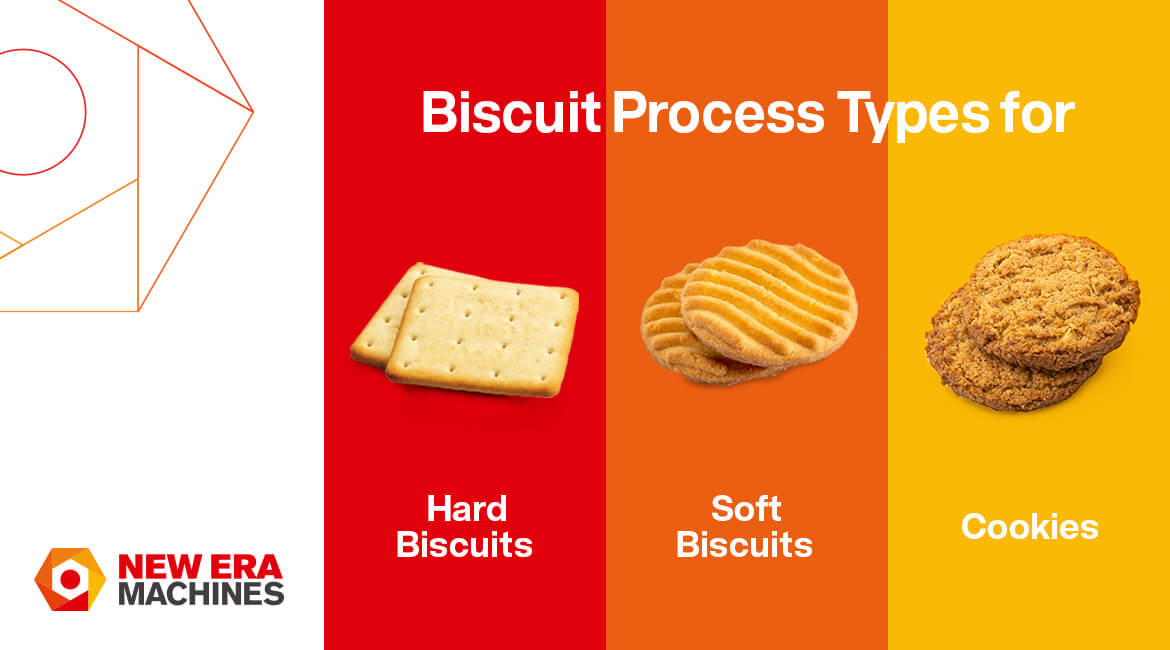Biscuit production is a tricky yet very interesting process. The dynamic nature, the diverse range of products, the market trends & the nitty-grits of production make it all the more interesting & captivating. To better understand the complexities involved & how to resolve them easily & efficiently, let’s have a look at the different types of biscuit production processes.
1. Processes For The Production Of Hard Biscuits & Crackers
Sheeting & Cutting: These are some of the initial processes that are involved in producing hard dough biscuits & crackers, that by nature are extensible. Hard biscuits tend to be salty, and savoury, containing less fat & calories. They are mainly served as snacks & made from grain flour dough. The dough is sheeted into layers & then passed through rolls to reduce the thickness in the sheeting & cutting process.
Laminating: The reduced thickness & finely cut dough is then transferred to the laminating section for developing structure and texture. This texture is enhanced during the baking process by proper regulation of heat, moisture & colour via the heat exchanger, heat bands & processes like convection inside the baking chamber.
2. Process For The Production Of Soft Biscuits
Rotary Molding: Soft dough biscuits are generally sweet, containing more fats, and calories than their hard biscuit counterparts. They are often served as desserts and contain sugar, flour, oil, egg & butter. Some famous examples include digestive biscuits, shortbread biscuits & coconut biscuits. The production process is relatively easier as it primarily involves molding of dough.
The dough is molded with the help of mold cavities in the biscuit line, extracted and then transferred to the baking oven. The rotary molding process eliminates the task of scrap cutting & wastage to a significant extent & often involves pre-sheeting in certain cases.
3. Process For The Production Of Cookies
Extruding, Wirecutting & Depositing: Your favourite cookies, be it choco chip cookies, shortbread cookies or butter cookies are made by this process. Here instead of sheeting or molding, the fluid dough undergoes the process of extrusion. In extrusion, the fluid dough or batter is passed through orifices via rollers or pumps.
After extrusion, the batter is generally wire-cut via the reciprocating wire into the desired shapes, be it bars, strips or any other shape.
The last process or type is depositing whereby the softest dough biscuits are made by depositing the batter with the help of nozzles & depositor’s head. The depositor’s head is an interesting device, it can rise and fall, move sideways, swing and even rotate to give different shapes to the biscuits. After these processes, the final baking happens inside the baking chamber.
The Final Lap: Baking & Special Applicators
Be it hard biscuits, soft biscuits, crackers or cookies, the end process common to all is baking. Hence it becomes one of the most important processes that require attention. The baking process usually happens inside a baking chamber, which is different depending on the type of fuel, mode or heat exchange method being used. The ovens mainly come in 4 types: Direct Gas fired, Indirect Convection type, Radiant Cyclotherm, or Hybrid. Depending on the type & mode, the heating process, the cooling process, colour, moisture, texture, and structure are all controlled & handled differently in each oven.
Once the work of the baking chamber is done, then comes the optional part, the use of special applicators. These applicators serve a majority of functions from oil spraying, sugar & salt sprinkling, and seed sprinkling among others. The special applicators can be considered either in pre or post-baking. A key work that special applicators do is in enhancing the flavours & condiments of the biscuits & cookies, thereby providing great taste.
In a Nutshell
Wrapping up, we are sure that with the details listed above you might have got a brief overview about the making of your favourite biscuits, cookies or crackers & how with the help of correct processes & machines, you can bake the ultimate experience. To be a witness to this revolution, you can consider new-age biscuit production lines from New Era machines, we have been serving a diverse clientele across countries & continents since their inception in 1956.
Our offering has the potential & performance to deliver unrivalled efficiency & experience in biscuit production. With dedicated expert assistance, customised layout options & turnkey solutions, our modern & tech-equipped cookie production lines have been established as the benchmark in biscuit making.



